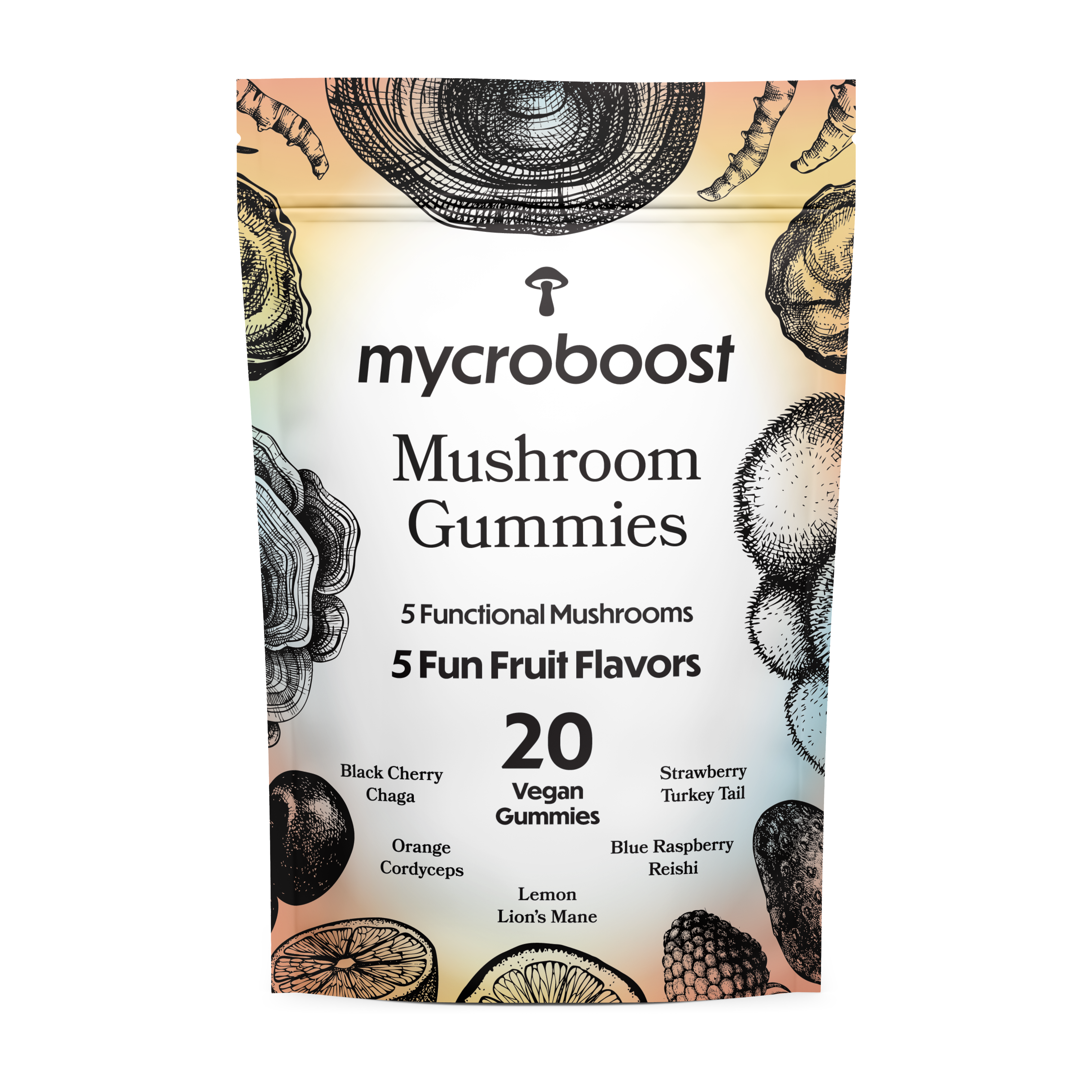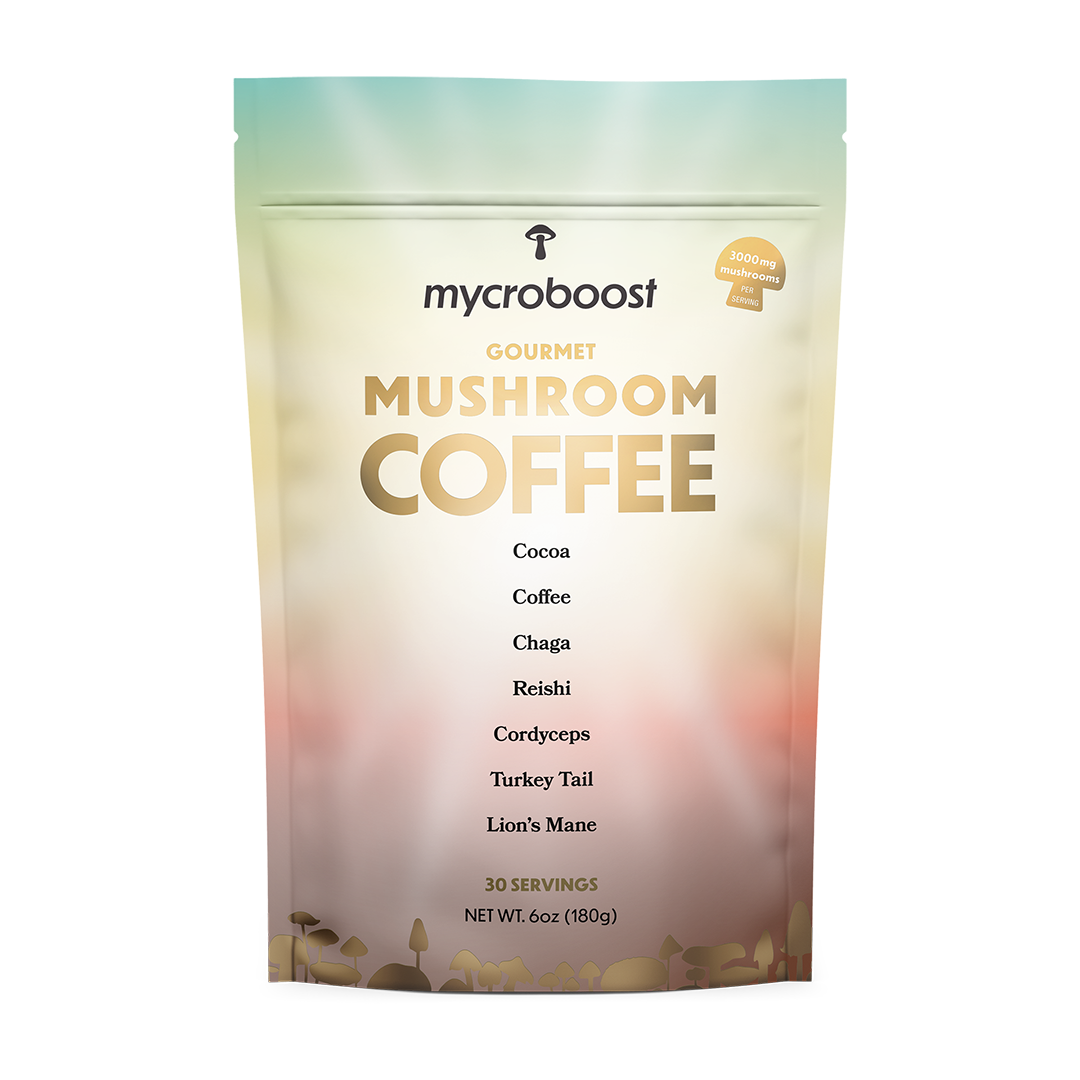The turkey tail mushroom (Trametes versicolor) is found virtually anywhere in North America that has forests and dead hardwood logs. If you’re in a wooded area, look closely at the bases of trees from May through December, and you’ll likely see turkey tail mushrooms with their signature ruffled shelf pattern and agate-like bands of earth tones.
Turkey tail mushrooms are beautiful, but their benefits for health have made them newly popular in the West. As with all functional mushrooms, turkey tail is not new to traditional Chinese medicine practitioners. Turkey tail has been used in Asian cultures for millennia to address various ailments, including respiratory infections, digestive issues, and liver problems. Its Chinese name is un-Zhi (cloud-like mushroom), while in Japan it’s known as kawaratake (mushroom by the river bank).
What is turkey tail good for? Here’s what the science says thus far about turkey tail mushroom benefits.
Turkey tail bolsters the immune system.
on’t come for us, FDA—we’re simply quoting the exact words used by UCLA medical doctors: “They [turkey tail mushrooms] act as nonspecific immune modulators. That’s a fancy way of saying that something either stimulates or suppresses immune function in a general way. Also, in turkey tail mushrooms, the effect is to bolster immune function.” According to UCLA Health, a clinical trial conducted in 2012 found that breast cancer patients who took capsules of powdered turkey tail. Mushrooms recovered immune function after radiation therapy more quickly than those who didn’t take the capsules. (As always, if you are a cancer patient, it’s essential to consult with your doctor before trying any supplements!)
A 2019 study published in the journal BMC Complementary and Alternative Medicine found that turkey tail mushroom extract exhibited immune-modulating properties. Turkey tail mushrooms contain compounds called beta-glucans, which can enhance immune function by stimulating the activity of immune cells. The turkey tail mushroom actually contains some of the highest levels of beta-glucans out of all mushroom species.
Turkey tail contains more than 30 different phenolic compounds and multiple flavonoids. Phenols and flavonoids both contribute to immune system function and overall health.
Turkey tail has also shown promise with regard to cancer care and chemotherapy supplementation. Research by Bastyr University and the University of Minnesota, found turkey tail may support conventional breast cancer therapies by strengthening a patient’s immune system.
Turkey tail may benefit the gastrointestinal system.
A 2014 study published in Gut Microbes found that polysaccharides in turkey tail mushrooms acted as a probiotic, stabilizing beneficial bacteria in the gut.
In another 2015 study, turkey tail was able to reduce obesity in mice by modulating the composition of their gut microbiota.
Numerous digestive diseases could be addressed through stabilizing the gut microbiome—and turkey tail is a prebiotic, meaning it contains fibers that promote healthy gut bacteria and digestive system function.
Turkey tail mushrooms have shown anti-tumor potential in numerous studies.
Turkey tail has been investigated for its potential to enhance the effectiveness of cancer treatments such as chemotherapy and radiation. It’s commonly used in China and Japan to support patients’ immune system recovery post-chemotherapy and radiation.
In Japan, a preparation made from the turkey tail mushroom has been used as complementary therapy in cancer treatment for decades.
In fact, polysaccharide K (PSK), the best-known active compound in turkey tail mushrooms, is an approved mushroom product for cancer patients in Japan.
Researchers in a 2021 study used polysaccharopeptide (PSP), a compound derived from turkey tail, to increase white blood cells, speculating PSP “could be an effective therapeutic intervention in targeting tumors.”
Turkey tail mushrooms have anti-inflammatory properties.
Turkey tail mushroom contain polysaccharopeptides, which have been shown to have anti-inflammatory properties.
Because inflammation is associated with so many chronic diseases, reducing inflammation in the body is considered beneficial for overall health.
As with all functional mushrooms, we need more research—but the existing evidence suggests that turkey tail supplements can be a valuable addition to a healthy diet and lifestyle.
Does Turkey Tail Grow In The Wild? Are They Edible Raw?
Yes, turkey tail mushrooms can be found wild in many parts of the world, including North America, Europe, and Asia. Turkey tail actually plays a key ecological role as a recycler of dead and dying trees.
They’re fun to look for in the woods! While turkey tail mushrooms are edible raw, they are not known for their taste, which is similar to the tree bark they grow on.
Turkey tail’s tough texture also makes it difficult to chew and digest, so it’s typically cooked, powdered, or prepared in an extract for human consumption.
Important safety note: If you do come across turkey tail in the wild, proceed with caution! While turkey tail mushroom is generally considered safe for consumption, it can be easily confused with other potentially toxic mushroom species. If you’re not 100 percent certain about the identity of a mushroom you find in the wild, do not eat it!
Want to try out turkey tail for health, wellness and prevention?
Our Mycroboost Wellness Mushroom Softgel features 300 mg of turkey tail extract per capsule. alongside a medley of other functional mushroom extracts (chaga, cordyceps, lion’s mane, and reishi) that can help your body and mind thrive.
Or try our Mycroboost Medicinal Mushroom Gummies, which features the same blend of chaga, cordyceps, lion’s mane, and reishi mushrooms along with 300 mg of turkey tail extract per serving in great-tasting gummy form.










